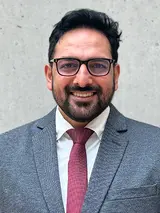The debate was co-organized by the first-year student of the Brandt School, Mr. Roman Bertoldo Coutinho and aimed to train students' presentation and communication skills. It focused on the developments taking place in the field of Artificial Intelligence, particularly in the aftermath of chatGPT. Students from the University of Erfurt were invited to argue in favour and against the development of AI.
In his keynote speech, Dr. Bokhari referred to the evolution and developments in the field of artificial intelligence dating back to the Turing Machine, a simple computational device developed by Alan Turing in the 1930s. Dr. Bokhari emphasized that the hype surrounding chatGPT should also acknowledge the work in the field of machine learning and predictive analytics. He gave examples of spell-checker systems in word processors, automated decision-making systems, smart homes, or self-driving cars. Dr. Bokhari also pointed out examples from popular media, such as Isaac Asimov's collection of novels "I, Robot," and Steven Spielberg's movies, "Artificial Intelligence" and "Minority Report," which not only predicted the future of AI but also depicted examples that are already part of our society.
The debate format was formed on the parliamentary-style debate, and the participants were provided input generated by the chatGPT focusing on arguments for stopping AI development and arguments to continue the development of AI. Dr. Bokhari was joined by his colleagues Barbara Kuntze and Timothy Bell as judges for the event.


